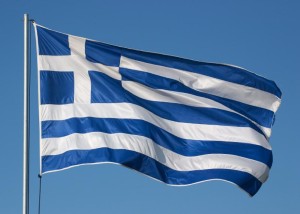UPDATE: CNBC has called the Greek election; the “No’s” have won.
 Greek voters resoundingly rejected the European Union’s austerity demands in a referendum today, with “No” winning by 61.3%-38.7% with all the votes counted.
Greek voters resoundingly rejected the European Union’s austerity demands in a referendum today, with “No” winning by 61.3%-38.7% with all the votes counted.
That means Greece’s socialist government — which called for the vote on EU’s bailout terms and urged people to vote “no” — will stay in power and try to negotiate a better deal.
Both the EU and Greek government want Greece to stay in the EU and euro currency system. Greece’s prime minister, Alexis Tsipras, had pledged to resume negotiations if “No” won. A “Yes” vote, supported by Greece’s bankers and business interests, probably would have led him to resign and resulted in elections for a new government.
The election was about more than Greece’s finances. Many Greeks have felt bullied and humiliated by their country’s creditors, led by Germany. Angry Greeks effectively were flipping them off by voting “No.”
Before today’s voting, the Greek finance minister predicted lenders would agree “within 24 hours” to better terms, but most observers expected a “No” victory to pave the way for Greece leaving the EU and abandoning the Euro in favor of a Greek currency that can be devalued to help the Greek economy recover.
Greece is in the grip of a severe depression, with 25% unemployment and 50% youth unemployment, and due to the lack of jobs many extended families have to get by on a single elderly family member’s pension. Greek pensions average about $750 a month, below poverty level. Germany and other EU negotiators have demanded deeper pension cuts and more tax increases, which they call “reforms,” as a condition of more financial aid. Many ordinary Greeks believed those demands would condemn them to perpetual poverty.
Under the circumstances, it’s surprising that “Yes” got over 30% of the votes. That probably was due to warnings of dire consequences for a “No” vote and fear of what might happen if Greece can’t reach an agreement with its creditors for more bailout aid, without which Greece’s banks will be unable to reopen and the economy likely will suffer further collapse.